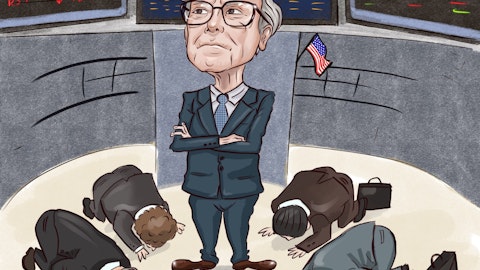Michael Lavery: And so some of what you are saying would be the depth of the promotion is part of how you want to make the investments on price points, but the discipline is the depth of that and not to push it too hard, would that be a right interpretation?
Carlos Abrams-Rivera: I think that would be one of the things that you could say. But I think on top of that, if you think about the full array of our revenue management tools, pricing, price architecture, other tools at our disposal that allows us to actually think about what is the right investments in order for us to maintain the level of – improving level of profitability that we have seen deteriorate over the last few years.
Michael Lavery: Okay. Thanks so much.
Carlos Abrams-Rivera: Thank you.
Operator: Thank you. [Operator Instructions] Our next question comes from Jason English with Goldman Sachs. You may proceed.
Jason English: Okay. Good morning folks. Thanks. So, I guess congrats are in order. Congrats, Miguel, for a good run and the improvements you have driven while at the helm of the company and congrats, Carlos, in the upcoming promotion and responsibility. So, on that topic, I guess the starting-off question is, what do you expect to do different? Should we be bracing and expecting any strategic shifts, or given that you have been an architect of many of the plans that have been in place, is this going to be sort of business as usual?
Carlos Abrams-Rivera: First of all, Jason, thank you for the kind words, and I am certainly very much humble and excited about the opportunity ahead for me and for the company. What I would say is that, as you pointed out, I have been sitting next to Miguel for the last almost 4 years now. And I think a number of things that we have done as a company, we certainly have done together. And strategically, I think that I am certainly committed to the three growth pillars that we have for going forward that is – and think about also how do we continue to drive our expansion in emerging markets, how do we continue to see foodservice as a great growth for us and then the growth platforms within our U.S. business. At the same time, you also probably read some of the changes we are making in our structure in order to actually help us accelerate some of those things that we have done.
For me, one of the critical aspects of this time when I have been transitioning as – and coming to the new role in January, has been listening to the organization and making sure we have the clarity of our strategy. And our structure is going to follow that clarity. So, some of the things you will see in terms of us being able to have a bit of breaking down the international zone which has worked in the past well for us, but now as we go into a new way of us growing, allows us to be a little more focused on those emerging markets in which we are going to make some additional investments. That, I think is part of us thinking differently about how we bring that structure and so that strategy to life in our structure. So, that’s I think some of the things that you are going to see, is what are the places that – with the lens of the jobs to be done for the strategy of the company, that we can maybe arrange certain things where we can truly leverage the scale of the company, the scale that we have been investing behind our technology and our marketing capabilities and to deploy them against the three pillars strategically that I am very much aligned with.
Jason English: And should we expect inorganic solutions to come into the fold a little bit more so now that your balance sheet is in a better situation?
Carlos Abrams-Rivera: As Andre said earlier, we continue to look at opportunities, but I would say that’s something that is part of our ongoing thoughts about how do we continue to see the active view of our portfolio. But there is nothing today that I would say that we will be announcing. Andre, anything else you would add?
Andre Maciel: No, I think that’s consistent with what we have said before. I think our priority is organic business and M&A. If it happens, it has to help us accelerate our organic strategy, essentially be fully consistent, like we have done less for acquisitions or sales elevation and pre-opting in emerging markets and to be accretive to our top line, bolt-on on top of acquisitions. That’s what we are focusing on.
Jason English: Understood. Thank you very much.
Carlos Abrams-Rivera: Thank you, Jason.
Operator: Thank you. [Operator Instructions] Our next question comes from Matt Smith with Stifel. You may proceed.
Matt Smith: Hi. Good morning. I wanted to ask a question. Your productivity savings have been very strong this year, and you already increased your target for the year. Those have in part been used to have a stepped-up level of investment behind marketing, R&D and innovation. But as we look forward, can you sustain this level of incremental savings into 2024, or should we expect a return to the target of $500 million? And after this year has stepped up investment, do you believe you are exiting with the appropriate level of investment across the business, or do you plan to continue to invest in an elevated rate as we look forward?
Carlos Abrams-Rivera: Maybe, Andre, if you could speak to our efficiency plans?
Andre Maciel: Sure. So look, at this point, we are still committed to deliver the 3% of COGS of $500 million on a go-forward basis. But as we have said before, our benchmark is really on the 4% level, which we are achieving this year. And you should keep in mind that this year as well, we had a lot of, let’s call, gettables from inefficiency that was generated from the pandemic, that’s also helping. But we feel good about how our supply chain organization today is operating at completely superior level with very stable service levels and being a lot more forward thinking, which gives us confidence in delivering that 3% that we have talked before. From an investment standpoint, I think this also has been a great year because we have been able to deliver very solid bottom line growth while really resetting the investment level from the company for the future, which means that I think a lot of the reset has happened.
There are still places that we want to invest more. But I think we took advantage of this year to really reset the level of investments to a very good level.
Matt Smith: Thank you, Carlos and thank you, Andre.
Operator: Thank you. [Operator Instructions]
Anne-Marie Megela: Operator, this will be the last question.
Operator: Thank you. And our last question comes from Robert Moskow with TD Cowen. You may proceed. Robert Moskow, your line is now open.
Robert Moskow: Hi. Can you hear me now?
Carlos Abrams-Rivera: Yes.




